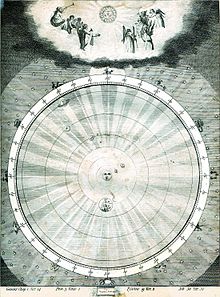Psalm 19
Psalm 19 recited in Hebrew. (Ogg Vorbis audio file, length: 1 min 32 s, 162 kbps)
The 19th psalm (according to Greek counting the 18th) is a psalm of David .
structure
The psalm can be divided into the following three sections:
- Verses 2-7: God's glory in creation
- Verses 8–11: joy in the instructions and laws ( Torah )
- Verses 12–15: Prayer request for grace for life
For a long time there was also a dichotomy:
- 19A: up to verse 7 (creation hymn)
- 19B: from verse 8 (Torapsalm)
Further structural observations would be:
- 2–7 The order of heaven
- 2–5a Praise the glory of God
- 5b – 7 The course of the sun
- 8–15 The order of the earth
- 8–11 praise of the Torah
- 12–15 The life of the prayer
Content
The following aspects shape the content of the Psalm:
- The opening verses in particular have often been interpreted as precursors to natural theology. Accordingly, one can also know God beyond explicit, verbal revelation.
- The motif of word / speech / speaking plays a role in vv. 2-5. These verses are puzzling not least because one wonders what these words are, which are nevertheless inaudible.
- The Hapaxlegomenon "Messschnur" (קַו), which probably means an astronomical measure for dividing time, is striking in v. 5a.
- The connection between the Sun and the Torah is not absurd. Already in the Codex Hammurapi (18th century BC) the sun god is the guardian of law and justice. Compare the Apla Iddina relief of the sun god Shamash. He can therefore ensure justice because he sees everything - such Mesopotamian and Egyptian ideas. This light-right relation can also be found elsewhere in the Tanach (Hos 6,3.5; Zef 3,5; Mi 7,8; Isa 62,1–2). Sometimes even the Torah itself is referred to as light (Prov 6: 20-23). Even today's church songs know the sun of justice.
- Ps 19.6 has a parallel in Mesopotamia: Compare Bit Rimki ritual series and the Mesopotamian sun god as bridegroom.
- The words for the revelations of Adonai are creatively varied in v.8ff: Torah (תּוֹרַת יְהוָה), instruction (עֵדוּת יְהוָה), commandment (מִצְוַת יְהוָה), legal decisions (מִשְׁפְּטֵי־יְהוָה). What is surprising is Adonai's fear (יִרְאַת יְהוָה), which is particularly valued in wisdom literature. It is more difficult to learn without humility, so this respect is the beginning of knowledge in general, but also of knowledge of Adonai in particular.
- V. 12 seems to presuppose a kind of doing-doing-connection, at least in the positive variant: Those who keep the Torah receive reward. If one takes rabbinical literature into account, then it is less about “work righteousness”. It is much more likely that the wages are based on the fact itself (“The wages of the deed is the deed”). There are rabbinical ideals of Torah followers who expect no reward for it.
- At the beginning and at the end there are God's designations: At the beginning it is El (אֵל), at the end it is Adonai (יְהוָה). If you want to link the question of dating to the use of El, then it was often assumed in the past that El marks an early date, as it is based on Ugaritic designations of God. On the other hand, one can assume a late date if one argues that El was used in Qumran as a substitute reading for the tetragram.
reception
Texts
- The Haggadic (= narrative) Midrash Tehilim takes up the phrase “The heavens tell the glory of God”.
- The Jewish morning prayer on weekdays also reminds in parts of Ps 19: Siddur sefat emet
God, praised, great in knowledge,
he prepared and created the rays of the sun ,
the good one did honor to his name.
He placed lights around his power,
the leaders of his armies are mighty,
they constantly tell the glory of God and his power ,
blessed be you, Eternal our God, for the glory of your handcraft
and whether the shining lights that you formed, they praise you.
- Rom 10: 14-18 embeds Ps 19: 5.
- Ambrose of Milan: Veni redemptor gentium
Settings
- The Heavens Tell the Glory of God ( BWV 76), is a spiritual cantata by Johann Sebastian Bach and begins with verses 2 and 4 of Psalm 19.
- Joseph Haydn The Heavens Tell , Trio and Choir No. 14 from the oratorio The Creation HobXXI: 2
- Ludwig v. Beethoven : The heavens extol the glory of God
- Felix Mendelssohn Bartholdy (1809–1847) created a motet under the same title . It was created in 1820 and bears the catalog raisonné S 81.
- The heavens, Lord, praise your divine power and honor ( SWV 115) is a four-part set of songs by Heinrich Schütz for Psalm 19.
- The second verse of this Psalm was also set to music in a canon by Alain Stamp.
Web links
Commons : Psalm 19 - collection of images, videos and audio files
- Psalm 19 in the standard translation , the Luther Bible and other translations from bibleserver.com
- Psalm 19 in the Biblia Hebraica Stuttgartensia (BHS) on bibelwissenschaft.de
- Sheet music in the public domain of settings for Psalm 19 in the Choral Public Domain Library - ChoralWiki (English)
Individual evidence
- ^ Panel BM or ME 91000, published as BBSt XXXVI.
- ↑ See also the list of works by Felix Mendelssohn Bartholdy
- ↑ Songbook: Singen, Praise, Danken, CLV (1994), 63


